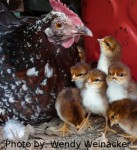One of our favorite times is when a hen in our home flock goes broody and hatches baby chicks. Some hens and some breeds have a stronger tendency to go broody than others, and some make better mothers than others.
If you’re mainly interested in egg production, you may consider broodiness a negative trait, but for my home flock, I consider both broodiness and mothering instinct to be positive traits because I want a flock that will perpetuate itself.
Standard Breeds
Standard size chicken breeds that are the most likely to go broody are:
Other breeds that have a relatively strong tendency to go broody are:
Bantams
Many types of bantams are very prone to broodiness. The bantams are small, and so are their eggs and the chicks that they hatch. Bantams will sit on large (standard breed) eggs and hatch them, but because of the hen’s small size, she can only hatch a few. Some of the Bantam breeds that are most likely to go broody are:
Have any of your hens gone broody recently and hatched out baby chicks? What breed was the hen? How many chicks did she hatch? Was she a good mother?





Our broodiest hens are our two Cubalayas. Next is a Shamo, and a Shamo/Sumatra cross. None of the others ever have gone broody. Oh, except the Cubalaya/Red Leghorn cross, who just starts living under the house when she’s broody. The first time, she emerged 21 days later with a single chick, but we have no more roosters.
It shouldn’t take a whole week to break the broody cycle. If you catch it right away, two or three days in a cage with food and water but no nest (allowing them out at dusk to scratch a bit then go roost as usual) is all it usually takes mine to recover from the broody hormones.
I recently had a Silver Laced Wyandotte go broody, late in the season. She is several years old, but although she lays only occasionally, I keep her to set eggs. She goes broody every year, sometimes will set and raise 2 clutches in a year. A few will be hers, and any others I want to hatch without a lot of work or worry, she doesn’t care. She hatched ducks for me last year. This year she hatched a bunch of Ameracaunas, and on day 2, when they were all hatched, I put 2 young peacocks in with her and the chicks in the outdoor pen. She pecked them to go away a bit on first day, but by the next day they were part of her brood. It is so funny to see them in the nest with the rest of them, they were always twice the chicks size. But all are growing well, I mix in turkey finisher and lots of veggie scraps with their feed, so everybody gets fed well. When the chicks were really small, I kept chick feed in a small cage that only they could get into, inside the run. Everyone is happy here in Southwestern Ontario, Canada. (We are 2 and a half hours North of Detroit, Mi.)
I raise OEG but have one Sumantran hen that gets broody at the drop of a hat. This year she has raised two brood of 10 each and has just hatched out an additional 8. She is a great mother and will if allowed take over responsibilities for other hens’ chicks. The first brood of 10 she raised she stole one of my OEG hen brood of 6 as her own.
My chickens are all free ranged, but they are very observant and always on the lookout for hawks and such, and so far I have lost only a couple to them.
My Mille Fluer had hatched two eggs, but another (full sized) hen attacked her and killed one chick. I saved the other chick. Bootsy has been in the den along with my 4 English Toy Spaniels since spring. He wants nothing to do with the other chickens but loves the dogs and me.. (I’m getting him chicken diapers …. He’s turned into a house chicken) … Meanwhile back in the “poultry parlor” his mom just hatched 9 eggs and is a wonderful mother …. Today she showed them how to take a dust bath….
My Columbina Wyandotte went broody for the first time and sat on wooden eggs for 21 days. I placed 4- 3 day old chicks, 2 Barred Rocks and 2 RIR. She took them graciously and was a great mother up until they reach 4 weeks. Now she has nothing to do with them. I have them in the coop, sectioned off with a heat lamp. Poor babies lost their mama.
We have about 40+ chickens, mostly Buff Orpingtons and Black Australorps. This spring and summer a bunch of them went broody, which surprised me as they had come from a hatchery (McMurray) and thus most were not raised under a hen. This was their first year laying too… We did manage to get the 11 Buffs under our tiny Silkie/Dutch bantam X, and she did a great job mothering. We got about 60-70 chicks this year- and they all hatched under hens.
My experience after several years of having different breeds of chickens is that: Silkies are great mamas, but can’t cover too many eggs, and produce fleas like you wouldn’t believe.
Americaunas won’t have anything to do with setting.
Orpingtons tend to be streaky, but there’s always a couple that go broody, and out of those there will usually be at least one good mama.
Our Turkens have been great, but since we’ve only had three, I don’t know for sure about the breed. However, we’ve been told by several folks that they are great setters, so we aren’t the only ones with broody Naked Necks. All 3 of ours and their one surviving daughter did brood, and were good mamas.
Australorps are very good setters, and practically all of ours went this year, but we didn’t let them all set. Cold water baths and getting locked in a wire cage for a day were needed to cure them though, as they were very persistent. The only problem with them is that they seem to be higher- strung than the Buffs, so sometimes are rather neurotic and step on their chicks.
Out of 3 standard sized, and 1 banty Cochin- 1 standard size didn’t set, and just ate the eggs, 1 set and killed any chicks I tried to give her that weren’t her own (the only hen I’ve ever had do that before), and 1 set great, though she was rather “dirty”, and hatched 13 chicks, and then accepted some 10 day old biddies a couple weeks later. The banty sets at least once each year, and does great.
Game chickens are very streaky setters. They are constantly going broody, but since they tend to be so high-strung and nervous, some of them break eggs, step on and squish their chicks, run into high grass and lose them, &c at the slightest alarm. Other than their excitability and hand- pecking propensities though, they make good little incubators.
So, these are the breeds I’ve had personal experience with. Hope this is helpful to those looking to buy a broody breed chicken!
I had a Sebastopol goose go broody on 8 eggs this spring. It was her first attempt at hatching eggs, and she did beautifully! Out of the eight, two were fertile. She hatched both of them out without a problem and was the most gentle, loving mother. The gander was just as tender with the goslings, and I had great fun watching them and taking pictures!
My Black Jersey Giant went broody for the second time this year, and I got her 12 heavy breed mutt eggs, and she hatched 10 of them 4 weeks ago … on the very same day that a fox killed 8 of the grown hens roaming in the field. A shame for sure but it did save me from having to make a larger coop. Another hen that escaped the slaughter was a Cuckoo Maran that is broody and was tucked away on the nest. She is now a wonderful ‘Auntie’ to the chicks. Wondering when the hen will bring the 10 into the main and now mostly empty coop – she and the 10 are getting a bit crowded in the brooding box.
My white cap black polish girl has gone broody 3 times since the spring, very good mom for a while then she will lay 2 eggs and sit for a month. She has had 3 sets of two this year. Also my Wyandotte hens live sitting on a nest. They have hatched about 40 chicks this summer, and they are the healthiest chicks I have ever had, no casualties.
I have 3 White Crested Polish hens, 18 mo old. Two have hatched, and one is setting now, will hatch next week. I am told this is not normal. One was a great mother raised all 8 of her chicks the other so so, only 3 out of 9. I have been pleasantly surprised as I was told they were not broody birds.
My Java’s are crazy broody. 2X each year. I even had one hen steal babies from another hen. My other good broodies are White Rock and Partridge Rock. They also went broody 2X this year. My white Cochin and Silver Dorking were really good mothers too. Not a single one of my BO, SLW, CW, EE, or LB went broody.
Four years in a row now I have successfully ordered 25 or 30 chicks and as it got dark, put in a broody little Black Silky hen with them. Sometimes I have to try a couple to see if one will take the babies. One didn’t want anything to do with them this year, but the second, smaller hen, who had been sitting on sterile eggs for a month, looked a little confused, then took right over, started talking to those standard sized chicks, teaching them to eat and drink right away. Eventually, at about 3 months, they get bigger than Mama, and you have to take her out, but she will raise that many standard chicks better than I can. Mama hen hardly ever loses a one, even in long wet grass. They call and call, and she will go hunt for the lost one and call until she finds it.
Diane S.
White Wyandotte; three White Wyandotte chicks; great mom! The other hen, a Silver-Laced Wyandotte, is the “back-up” mom – she also went broody but had no eggs to hatch. Still, she sat as though setting, watched as though keeping guard, and readily protects and talks to the chicks as if they were her own. Even the big, gentle White Wyandotte rooster “baby sits” the kids. I’m very, very happy with this breed – they are everything I’d hoped they would be. The other two hens, another White Wyandotte and a Golden-Laced Wyandotte, showed signs of going broody, but were stolen by a fox before they had a chance to raise some babies, too.
I LOVE having a broody hen!
We successfully “adopted” 26 day old chicks to a broody Buff Orpington. The process was to order the chicks (all females plus a non-sexed chick extra). When they came in at the post office, I rushed down to get them, gave them their sugar water (at room temperature) and put them under a heat lamp.
Come the dark of night, we started introducing the broody [who was absolutely committed to hatching out the five golf balls she sat on for two weeks] to her babies by placing them behind her. She accepted 16 chicks, and began balking at the rest, which we separated at the far end of the long secure coop with the heat lamp.
Next morning things were going swimmingly, she was absolutely in love with her hatchlings, and we opened up the whole coop. I mean, she wasn’t going to be nursing them, right?? She accepted every one of those chicks, and is a fantastic mother.
They are growing at an astounding rate, scratching and digging and dusting, just like Mama taught them. They eat and drink a LOT, so be ready. And definitely have a secure yard to let them into after a week, as even a large coop gets crowded quickly. And stinky. Make plenty of roost space, since the little dears will jump on Mama’s back and up onto a roosting pole quite early!
Our “tall yard” is 12 feet tall, but they could easily walk through the mash, so we cut up old feed sacks and lined the yard with them, using a staple gun with extra long staples and clothespins.
Be sure to keep a chair nearby for hours of entertainment! And put the water in as barren a spot as you can, since they love to scratch their straw into it and make it yukky! We’re appreciating the double walled 2 gallon waterer. We have to refill it each day. Also, we appreciate the two gallon multi station hanging feeder since we can suspend it away from their straw scratching, but still at a height the little dears can reach. For now we mix granite gravels in with their dry crumbles, but also have a separate and dedicated granite grit/gravel can in their yard.
I love chickens!
My Black Stars go broody every year and hatch 8 to 15 chicks several times a year. My biggest problem is chicks getting into the livestock water tanks and drowning even though I keep water down on the ground for them anyone that has any ideas how to keep them out of the tanks would be greatly appreciated, thanks. My Cochins, standard and bantams go broody all the time, but for whatever reason they rarely hatch. Also as much as I love them, they are so laid back they are the first to get eaten by the owls, chicken hawks, foxes and stray dogs.
I also have a stock tank that things seem to get into, so I put a board in the tank. The board is longer than the tank, so one end goes down in the water, and the other is up in the air. Anything that falls in can get to the board and get out .
I’ve rescued one chick from the duck pond and lost one. Consider putting one of those paint roller things on the side – don’t know what the actual name for them is but it’s a metal screen designed to hook on the top of a 5 gallon paint bucket to roll the paint roller on instead of using a tray. If they can flap over to it they can pull themselves out.
Our little Belgian d’Uccle sat on five eggs and eventually one hatched. She promptly abandonded the other eggs to tend to her very needy offspring. These are all free ranging birds, and after about a week or so mom had her little one out and about the yard with her. Last weekend a huge hawk came down and snatched mom away :( It was a very sad moment, but I’m doing everything I can to keep the little one warm, fed, watered, and happy. He’s all I have left of his mom (this was her first attempt at motherhood), so I’m taking good care of him.
I’ve had a Silver Spangled Hamburg, Sicilian Buttercup, Dark Cornish, Partridge Rock, and Buff Orpington go broody. I hope that some of my current batch of Buff Orpingtons go broody next year. Broody hens are the easiest way to way incubate and get chicks because all you have to do is provide secure shelter and food & water, and mama hen does the rest. No worry about losing an entire batch of eggs or chicks to a power outage, either.
My white rocks have consistently gone broody and are the best mothers!
In the past two months, I have had five hatch off. I have Silkies, and they are laying like crazy, even in this Florida heat, but they’re not up to sitting right yet. I set their eggs under my broody mutt chickens; they want to sit year round. I have to really watch them. They cover up to eighteen Silkie eggs and do very well. When a Silkie starts to sit she may rest on just two or three and will fight to the death for them. I set my incubator when they start … when they start to hatch off so does my incubator. They get to tend the babies … Yeah.
Be sure and put babies under the moms at night; she’ll love them just the same. :D
Our Buff Brahma Bantams went broody early on and raised lovely chicks; we kept them in the chicken tractor at first, watched our dog for signs of wanting to eat the chicks & reinforced “no” to that idea, then let them free-range, and they did wonderfully! When both hens went broody, our rooster started “bonding” with my partner Ed – following him EVERYWHERE and getting a little “testy” about anyone strange coming into the area… I would heartily recommend this breed for longevity, broodiness, beauty, and ease of keeping – they forage wonderfully for their own food and cost little in feed if given free range.
My Buff Orps go broody regularly. But this year one of my Easter Eggers went broody, she’s a GREAT mom, better than most of my others. I had 6 broody at a time. I still have 2 broody and little chicks running around everywhere.
My bantams are constantly going broody. I had a hen who was arthritic and mostly blind – and she was the best mother hen we had. She hatched 22 of the 28 eggs she sat on and actually ended up with a brood of 25 (the other hen who hatched only wanted the ones that matched her colour – that was an oddity). I’m not sure how this hen managed to feed all these chicks – they were foragers – but she did. The chicks all came to maturity, but that may in part be to the vigilance of our rooster! He challenged a peregrine falcon in the front yard and managed to scare him off, after getting his hens to safety, of course.
My daughters BB Red Old English show hen went broody about 6 weeks before the fair. We thought a hawk had gotten her, but she had escaped the yard and was sitting on a batch of eggs that would never hatch (no rooster). She appeared about 2 weeks before fair, looked pretty good, and we managed to catch her before she make it back under the giant juniper bush. It took the full 2 weeks to break her! Maybe next year for her!
Wheaten Americana 2nd year. She is 5 yrs old and still lays eggs when she’s not broody. Once her and chicks are out of brood house, when chicks are about 8 weeks old no one in the general population can bother the chicks.
I have Buffys (Orpingtons), and they do get broody pretty regularly. Any advice on snapping them out of it? We have one right now we’ve named Crazy Chicken, and she won’t stop for anything. Weeks now, and even when we lock her out for the day. She just goes right back to the nest ASAP.
Leslie, see our article: Breaking a Hen of Broodiness
That’s funny, I have a buff named NUTSY because of her broody tendencies … havent figured out if anything snaps them out of it.
I’ve had broody hens that I had to break of the habit. My grandma’s tip was to make an A-frame with wood then put a pie-pan of water in it, and add the chicken. My grandma said less than a week and they would be broken of sitting. This always worked for her.
I have six left out of a clutch of 12 under a Buff Orpington hen. They walked right through the fence of 1-1/2 inch chicken wire. And half of them never came back.
We had a red sex link that started sitting on a clutch of guinea eggs a few weeks back, and some of them hatched, and she is just the greatest mother. I think she’s one of our really old hens and isn’t doing much egg production anyway. So it’s kind of nice getting a few guineas from her.
We don’t have roosters, so broodiness means no eggs. Our hens – often but not always after moulting – go broody with a vengeance. Recently an Orpington went broody and wouldn’t roost, and the raccons got her. We’ve had fairly consistent problems with Australorps, too. One was broody for so long, she nearly died from starvation/dehydration. Perhaps we should get a rooster?
Get a few fertile eggs…either buy them in a breed you like or see if you can grab some from your local freecycle.
Yes 3 hens have gone broody.
My BLRW Wyndotte was a terrific mother, she hatched 3 chicks, sadly she was taken by a hawk.
My bantam black Cochin Tilly didn’t put any eggs under her.
My Black Wyndotte, Winny 9 eggs placed under her this morning…BC Marans. Fingers crossed for a good hatch rate. First time I ever had eggs mailed to me.
Both Wyndottes came from reputable breeders of heritage birds.
Mari,
Do you have BC Maran hens and getting eggs from them? I am trying to get a start of them and not having much luck. Do have a rooster but he is old and not sure he is fertile. Where do you live? I live in Arkansas. Would love hearing from you.
Thanks,
Floyce